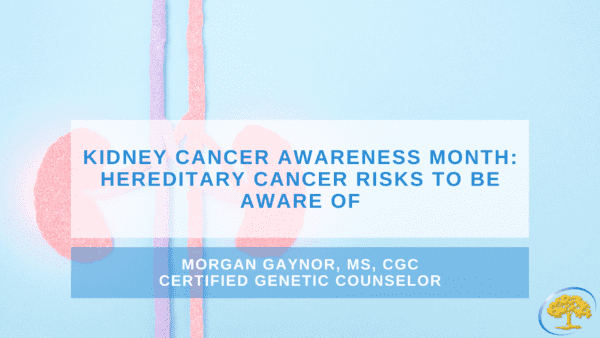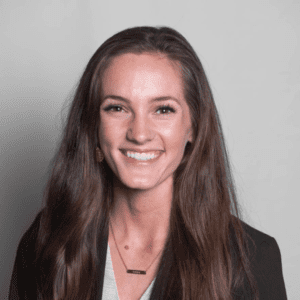
Posted 1 year ago
Kidney Cancer Awareness Month: Hereditary Cancer Risks to be Aware Of
March is Kidney Cancer Awareness Month. This month prompts us not only to spotlight the disease but to delve into the hereditary risks associated with the cancer as well. Recognizing signs of potential hereditary risks is crucial and can help guide healthcare providers to recommend specific genetic testing. Signs such as a family history of kidney cancer, early-onset cases, and the presence of multiple cancers within a family are red flags that warrant a closer look. Genetic counselors may recommend genetic testing to help individuals understand and manage their potential hereditary risk.
There are several genes associated with an increased risk for kidney cancer when mutated. Some examples of these include VHL, FLCN, and FH. The following includes important information about the cancer risks associated with each of these genes, and their appropriate screening and medical management recommendations.
People with a single VHL gene mutation have a condition called von Hippel-Lindau syndrome and are at an increased risk to develop kidney cancer, specifically clear cell renal cell carcinoma, and certain types of tumors, such as, pancreatic neuroendocrine tumors, PGL and PCC, retinal hemangioblastomas, central nervous system hemangioblastomas, and inner ear tumors. Screening recommendations may include regular physical exams, blood pressure monitoring, formal hearing exams, blood and/or urine screening, and imaging of the abdomen, pelvis, and inner auditory canal.
People with a single FLCN gene mutation have a condition called Birt-Hogg-Dubé (BHD) syndrome and have an elevated risk of kidney cancer, especially oncocytomas and chromophobe renal cell carcinoma. This condition also increases the risk for skin lesions, lung cysts, and pneumothorax. Screening recommendations may include regular skin exams to monitor for skin lesions, and regular imaging of the abdomen and lungs. Those with an FLCN mutation should also avoid risk factors related to pneumothorax when possible.
People with a single FH gene mutation have a condition called Hereditary Leiomyomatosis and Renal Cell Cancer (HLRCC), which increases the risk of cutaneous and uterine leiomyomas, PGL and PCC, and kidney cancer, especially papillary renal cell carcinoma (pRCC). This is not to be confused with the FH carrier mutation, which is not associated with HLRCC at this time. Screening recommendations may include regular skin exams, blood pressure monitoring, imaging of the abdomen, and gynecologic screening for women, including uterine surveillance.
Those with a personal and/or family history of the findings above may benefit from genetic testing. Children, siblings, and parents of individuals with these mutations have a 50% chance of having the same mutation. It’s also important to note that both males and females can inherit a mutation and can pass it on to their sons and daughters. Most individuals with a mutation inherit it from a parent, however, there have been reported de novo cases (an individual is the first in their family to have the mutation).
Kidney Cancer Awareness Month calls for us not only to raise awareness but also to recognize signs of potential hereditary links, understand the role of genetic testing, and adhere to age-specific screening recommendations. Recognizing family patterns, understanding the genes associated with hereditary risks, and considering genetic testing when appropriate can empower individuals to take proactive steps toward early detection and effective management. If you have questions about kidney cancer or other hereditary cancer predisposition syndromes, please speak to your Ironwood provider about a referral to Ironwood’s Genetic Services department.
Morgan Gaynor, MS, CGC
Certified Genetic Counselor
Morgan Gaynor Joined Ironwood Cancer & Research Centers In May 2022. She Earned Her B.S. In Molecular Biology And Genetics From Regis University And Earned Her M.S. In Genetic Counseling From The University Of Arizona.
During Her Time At The University Of Arizona, Morgan Completed A Two-Year Graduate Program And A Thesis On Best Practices In Counseling Low-Level Pathogenicity Results In Cancer Genetics Settings. She Completed Clinical Rotations At Prominent Healthcare Systems Such As Banner, Mayo Clinic, Color Genomics, Phoenix Children’s Hospital, And Dignity Health. During Her Time At These Institutions, She Gained Experience In Prenatal, Cancer, Cardiology, Pediatrics, And Pharmacogenomics Counseling.
Morgan Enjoys Running, Swimming, Cycling, Playing Piano, Hiking, And Spending Time With Her Family.
Please ask your Ironwood Cancer & Research Centers doctor for a referral to see our genetic counselor.

